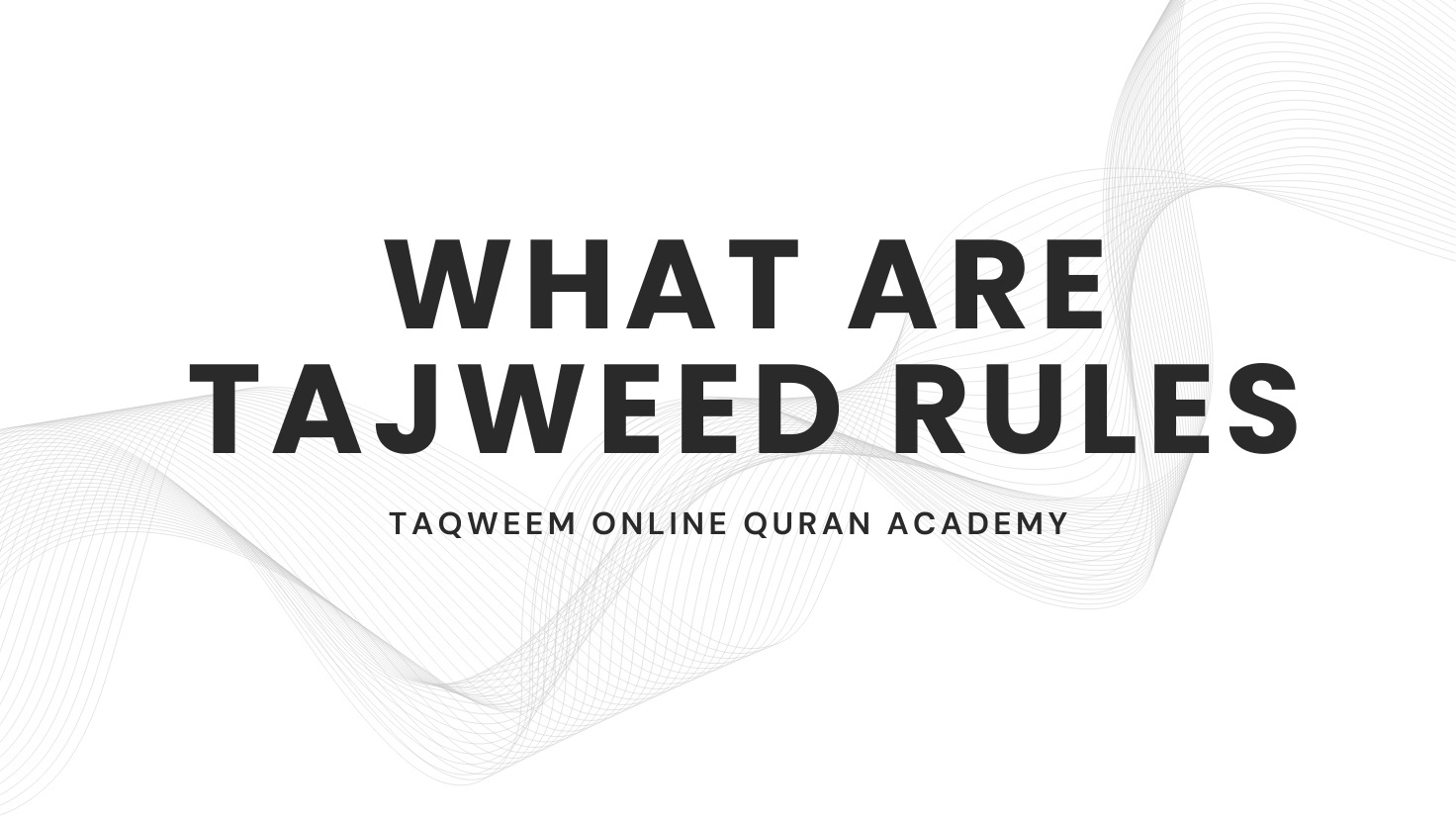Table of Contents
ToggleWhat Are Tajweed Rules and Why Do They Matter?
Tajweed rules are the guidelines that teach us how to pronounce every letter of the Quran exactly as it was revealed. They protect the beauty, clarity, and meaning of Allah’s words, ensuring that recitation is not just correct but also heartfelt. Without tajweed, even small changes in pronunciation can alter meanings. That’s why learning tajweed rules matters—it’s about honoring the Quran with precision, respect, and love.
I’ll be honest with you. For the longest time, I thought reading the Quran was just about knowing the Arabic letters, stringing them together, and finishing a page. I’d rush through, my tongue stumbling, my breath breaking in awkward places. But then one day, someone corrected me gently: “The Quran is not just to be read. It’s to be recited the way it was revealed.”
That’s when I met Tajweed. And it changed everything.
What is Tajweed?
The word Tajweed comes from “jawwada,” meaning to make better, to beautify. In simple terms, Tajweed is the science of pronouncing every letter of the Quran correctly—giving each sound its due right.
It’s not about singing. It’s about respect. It’s about ensuring that when we say the words of Allah, we don’t distort their meaning by mispronouncing them.
Why Tajweed Matters
Think about it. If someone mispronounces your name, you feel unseen, unheard. Now imagine reciting Allah’s words without care. The meanings can change entirely.
For example:
-
The word “qalb” (heart) and “kalb” (dog) are separated by one tiny dot.
-
Stretching or shortening a vowel can turn praise into insult.
Tajweed protects the Quran. And in protecting it, it protects us.

The Origins of Tajweed
Tajweed isn’t something scholars invented later. It is how the Prophet ﷺ himself recited. The Sahabah learned directly from his lips. Their students preserved it, passing it generation to generation until it became a structured science.
This is why when you listen to a skilled Qari, you feel transported—it’s not just sound, it’s heritage.
Core Rules of Tajweed (The Essentials)
To build authority, let’s go through the main pillars of Tajweed.
1. Makharij al-Huroof (Articulation Points)
Every letter has a home in the mouth, throat, or nose. Tajweed teaches you where to release the sound so it’s not confused with another.
2. Sifaat al-Huroof (Letter Characteristics)
Letters carry qualities: some are strong, some are soft, some whisper, some press hard. Balancing these traits is part of the beauty.
3. Noon Sakinah & Tanween
Rules like Idgham, Ikhfa, Iqlab, Izhar—each governs how “n” sounds merge, hide, or transform in recitation.
4. Meem Sakinah Rules
Similar rules for the letter Meem: Idgham Shafawi, Ikhfa Shafawi, Izhar Shafawi.
5. Madd (Prolongation)
Stretching vowels for two, four, or six counts. This is where rhythm enters the recitation.
6. Qalqalah
That “echo” sound you hear at the end of certain letters (ق ط ب ج د). It gives clarity and sharpness.
7. Ghunnah
The nasal sound in Noon and Meem with shaddah. It’s soft but powerful.
The Spiritual Side of Tajweed
Sometimes, people think Tajweed is only technical. But when you actually apply it, you feel the Quran differently. A stretched Madd can make you pause. A strong Qalqalah can wake you up. A soft Ghunnah can move your heart.
Tajweed isn’t just rules. It’s the melody of Revelation.
Common Mistakes Learners Make
-
Rushing through words without pausing.
-
Mixing letters (like س and ص, or ط and ت).
-
Not observing elongations.
-
Treating Tajweed like decoration instead of obligation.
Mistakes are normal. What matters is correcting them.
How to Learn Tajweed
You can’t learn Tajweed from a book alone. It needs a teacher—someone who can listen to you, correct your tongue, and pass down the chain of sound that traces back to the Prophet ﷺ.
That’s why circles of Tajweed are so precious. Sitting with a teacher, repeating the words, getting corrected—it’s like polishing your voice until it shines.
Why This Matters for You
The Quran is not just read—it’s lived. Tajweed is how we preserve its sound, its rhythm, its sanctity. Imagine on the Day of Judgment, standing before Allah, and saying: “Ya Allah, I tried to recite Your words as You revealed them.”
That’s Tajweed. It’s sincerity. It’s love.
Closing Thoughts
If you’ve ever felt unsure while reciting, or wished your voice could flow like the Qaris you hear, start with Tajweed. Don’t rush. Even one letter perfected is an act of worship.

A Gentle Invitation
If your heart is whispering, “I want to learn Tajweed,” don’t ignore it. Start your journey with Taqweem Academy. Their teachers guide you step by step, patient with your mistakes, until your recitation feels natural, confident, and beautiful.
Enroll with Taqweem Academy today. Your voice deserves to carry the Quran the way it was meant to be heard.
FAQs
What are the rules of Tajweed in Islam?
Tajweed rules are the guidelines for correct Quran recitation, covering pronunciation, elongation, pauses, and letter articulation.
What are the 7 rules of Tajweed?
The 7 main Tajweed rules are Ikhfa, Idgham, Iqlab, Izhar, Qalqalah, Ghunnah, and Madd.
What are the 4 basic rules of Tajweed?
The 4 basics are Izhar, Idgham, Iqlab, and Ikhfa. These apply to Noon Saakin and Tanween.
What are the 12 Tajweed rules?
The 12 rules include Noon Saakin, Meem Saakin, Qalqalah, Ghunnah, Madd, Tafkhim, Tarqiq, Lam rules, Ra rules, Waqf, Hamzah, and stopping/continuation rules.
How many Tajweed rules are there?
Scholars classify Tajweed into basic rules (4), intermediate (7), and detailed rules (12 or more) depending on study level.
Can I learn Tajweed online?
Yes, Tajweed can be learned online through PDFs, apps, and videos, but correct recitation requires guidance from a qualified teacher.
Can I teach myself Tajweed?
You can begin Tajweed by self-study, but full mastery needs a teacher to correct mistakes in articulation and fluency.
What is the importance of Tajweed in Quran?
Tajweed preserves the authentic recitation of the Quran as revealed, ensuring every letter is pronounced correctly without distortion.
Is Tajweed mandatory in Islam?
Tajweed is Wajib (obligatory) to the extent of avoiding mistakes that change meaning, while mastering advanced Tajweed is Sunnah and highly recommended.
Which Tajweed book is best for beginners?
Popular beginner-friendly Tajweed books include “Tajweed Made Easy”, “Qaida Nooraniyah”, and “Al-Muqaddimah al-Jazariyyah.”






